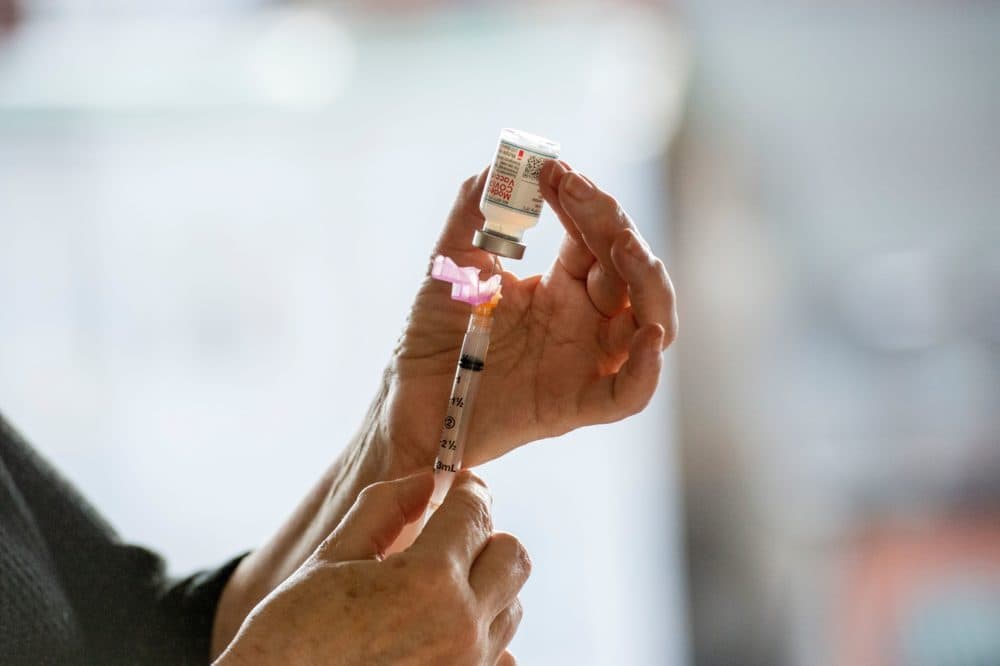Advertisement
Can Employers Require Workers To Get The COVID-19 Vaccine? One Expert Says It's Complicated
Resume
The more people get vaccinated, the quicker the coronavirus pandemic can be tamped down and life can return to normal — that’s how vaccines work.
Some airlines are already starting to require flyers to show proof they’ve tested negative. And soon, airlines, sports arenas and entertainment venues may ask for proof of COVID-19 vaccination.
International travelers to certain countries have likely had to show proof of the required vaccines. Children have to obtain certain shots at most schools.
But can an employer require employees to roll up their sleeves and get the COVID-19 vaccine?
The legality around the question is being debated by ethicists. The U.S. government has approved the Pfizer/BioNTech and Moderna vaccines under Emergency Use Authorization [EUA], which may complicate things further, says Dorit Reiss, law professor at the University of California Hastings College of the Law who specializes in vaccine law policy.
On one hand, she says, the law says vaccine recipients need to be informed that they can refuse the shot and any consequences of that decision, implying recipients have a choice in the matter, Reiss says.
But the law also gives “conflicting signals” to employers, she says.
“On the other hand, the law does say that there could be consequences and says nothing to employers,” she explains.
Mandating a coronavirus vaccine hasn’t been before a court, meaning there are no rulings to help guide employers in their decisions. Because the COVID-19 vaccine is so new and hasn’t completed two years of testing, it might not be legal to require it, she says.
Dr. Arthur Caplan, a top medical ethicist, has said an EUA vaccine requirement would never hold up to a legal challenge. Law professor Peter Meyers of George Washington University Law School has said the Food and Drug Administration’s Fact Sheet notes that the recipient or their caregiver has the option to accept or refuse the Pfizer vaccine.
Reiss says yes, the law says you have the right to refuse, but it doesn’t guarantee that you still have the right to work.
"Employers, especially private employers, have the right to decide who will work for them," she says.
On top of ethics, employers are thinking about questions of legality, she says.
“If you require your workers to [get] the vaccine and something happens to a worker, there's both an ethical problem and there might be liability under workers compensation,” she explains. “On the other hand, if you don't require the vaccine from your workers and one of them infects another worker or a customer, again, you face an ethical problem and potential liability. “
The issue is bound to become even muddier when the inevitable happens — an employee refuses to be inoculated and an employer says it’s their right to fire the employee on the basis of protecting their workforce. Reiss predicts this scenario will be a toss-up when it ultimately ends up before a judge.
“The Equal Employment Opportunity Commission, the agency that advises employers about discrimination in the workplace, has guidance that suggests, yes, you can mandate the vaccine under an EUA,” she says. “And to remind you, employers have been mandating testing and many of the tests are still under an EUA too.”
There’s a middle ground approach employers may take: If an employee refuses the vaccine, an employer may then require them to layer on extra personal protective equipment, separate from others in the workspace or even work remotely. Refusing the vaccine on the basis of a medical exception or religious objection is a legal right that must be accommodated, she says.
Employers can terminate a worker if the employee both refuses both a vaccine and extra precautions like PPE, she says, a scenario that will likely end up in court.
As the vaccine rollout continues in the U.S., many companies have offered their employees financial incentives to get vaccinated.
Dollar General, for instance, is giving additional compensation to employees who get inoculated. Houston Methodist Hospital’s CEO told Here & Now he’s offering a $500 bonus to staff members who get the vaccine.
These incentives are “very appropriate” for companies who wish to encourage healthy behavior, Reiss says.
“Giving money for vaccinating can be seen as a wellness program,” she says. “You're giving a financial incentive for people to do things that keep them healthy.”
Julia Corcoran produced and edited this interview for broadcast with Todd Mundt. Serena McMahon adapted it for the web.
This segment aired on January 19, 2021.

